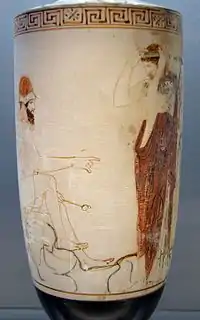العالم السفلي اليوناني
في الميثولوجيا، العالم السفلي اليوناني هو عالم آخر حيث تذهب إليه النفس بعد الوفاة. الفكرة اليونانية الأصلية عن الآخرة هي أنه في لحظة الموت، يتم فصل الروح عن الجثة، وتأخذ شكل الشخص السابق، ويتم نقلها إلى مدخل العالم السفلي.[1] العالم السفلي نفسه - المعروف أحيانًا باسم هاديس، سميت بسبب إلهه الراعي - يوصف بأنه إما على الحدود الخارجية للمحيط أو تحت أعماق الأرض أو نهايتها.[2] يعتبر النظير المظلم بالنسبة لسطوع جبل أوليمبوس مع مملكة الموتى المقابلة لمملكة الآلهة.[3] الجحيم هو عالم غير مرئي للحياة، مصنوع فقط للموتى.[4]
المراجع
- Long, J. Bruce (2005)، Encyclopedia of Religion، Detroit: Macmillan Reference USA، ص. 9452.
- Garland, Robert (1985)، The Greek Way of Death، London: Duckworth، ص. 49.
- Fairbanks, Arthur (01 يناير 1900)، "The Chthonic Gods of Greek Religion"، The American Journal of Philology، 21 (3): 242، doi:10.2307/287716، JSTOR 287716.
- Albinus, Lars (2000)، The House of Hades: studies in ancient Greek eschatology، Aarhus University Press: Aarhus، ص. 67.
المصادر
- Albinus, Lars (2000)، The House of Hades: Studies in Ancient Greek Eschatology، Aarhus: Aarhus University Press.
- Buxton, R (2004)، The complete World of Greek Mythology، London: Thames & Hudson Ltd..
- Camus, Albert، "The Myth of Sisyphus"، مؤرشف من الأصل في 24 أغسطس 2019، اطلع عليه بتاريخ 03 ديسمبر 2012.
- Fairbanks, Arthur (1900)، "The Chthonic Gods of Greek Religion"، The Johns Hopkins University Press، 21 (3): 241–259، doi:10.2307/287716، JSTOR 287716.
- Garland, Robert (1985)، The Greek Way of Death، London: Duckworth.
- Leeming, David (2005)، "Demeter and Persephone"، Oxford University Press، doi:10.1093/acref/9780195156690.001.0001، ISBN 9780195156690، مؤرشف من الأصل في 12 يونيو 2019، اطلع عليه بتاريخ 02 ديسمبر 2012.
- Leeming, David (2005)، "Styx"، Oxford University Press، doi:10.1093/acref/9780195156690.001.0001، ISBN 9780195156690، مؤرشف من الأصل في 17 سبتمبر 2020، اطلع عليه بتاريخ 02 ديسمبر 2012.
- Long, J. Bruce (2005)، "Underworld"، Macmillan Reference USA، 14: 9451–9458.
- Mirtro, Marina Serena (2012)، Death in the Greek world : from Homer to the classical age.، Norman: University of Oklahoma Press.
- Mikalson, Jon D (2010)، Ancient Greek Religion، West Sussex: Wiley-Blackwell.
- Mystakidou, Kyriaki؛ Tsilika, Eleni؛ Parpa, Efi؛ Katsouda, Elena؛ Vlahous, Lambros (2004–2005)، "Death and Grief in the Greek Culture"، Baywood Publishing Co.، 50 (1): 23–34، doi:10.2190/yyau-r4mn-akkm-t496.
- O’Cleirigh, Padraig, Rex A Barrell, and John M Bell (2000)، An introduction to Greek mythology : story, symbols, and culture، Lewiston: Edwin Mellen Press.
- Peck, Harry Thurston (1897)، Harper's Dictionary of Classical Literature and Antiquities، Harper.
- Pfister, F (1961)، Greek Gods and Heroes، London: Macgibbon & Kee.
- Scarfuto, Christine، "The Greek Underworld"، مؤرشف من الأصل في 11 ديسمبر 2019، اطلع عليه بتاريخ 03 ديسمبر 2012.
- Schmiel, Robert (1987)، "Achilles in Hades"، The University of Chicago Press، 82 (1): 35–37، doi:10.1086/367020، JSTOR 270025.
- بوابة موت
This article is issued from Wikipedia. The text is licensed under Creative Commons - Attribution - Sharealike. Additional terms may apply for the media files.

